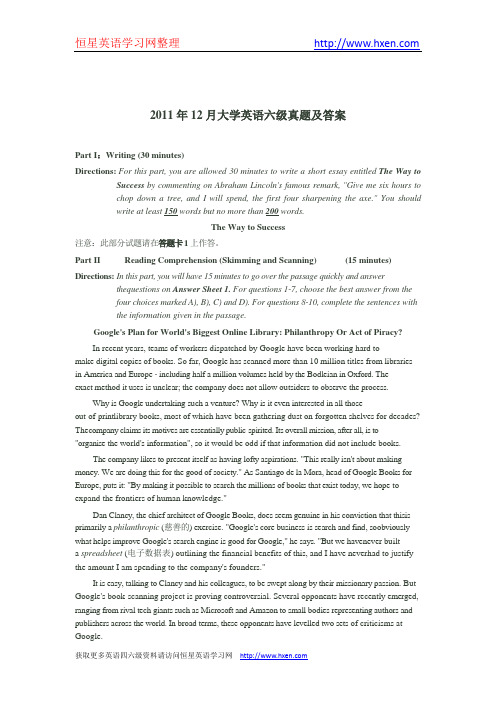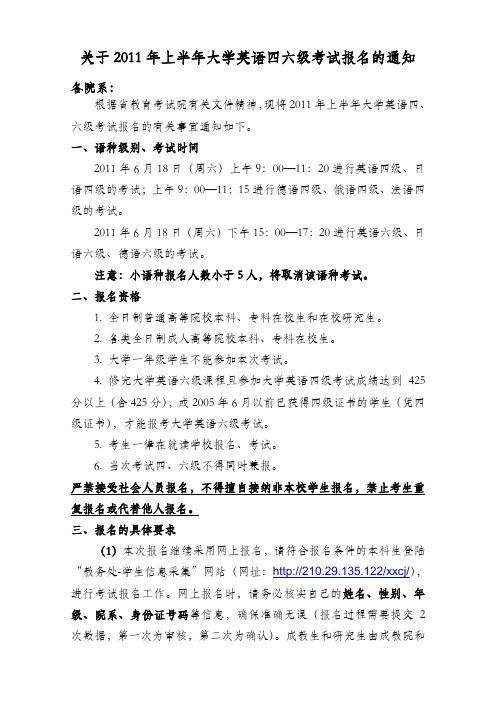2011年12月四、六级报名通知
- 格式:doc
- 大小:28.50 KB
- 文档页数:1


2011年全国性考试时间表1月8日-9日高等教育自学考试15日-16日研究生入学考试3月5日英语专业八级考试26日职称英语考试26日职称日语考试26日职称俄语考试26日-30日全国计算机等级考试4月16日英语专业四级考试16日-17日注册咨询工程师16日-17日投资建设项目管理师5月14日初级会计职称考试14日-15日中级会计职称考试21日-22日计算机软件考试28日-29日监理工程师考试28日-29日环境影响评价工程师考试28日剑桥商务英语中级考试29日管理咨询师考试6月7日-8日高考11日-12日土地登记代理人考试12日质量工程师考试17日-19日注册税务师考试18日大学英语四级考试18日大学英语六级考试9月3日-4日注册资产评估师考试3日-4日注册设备监理师考试3日-4日注册安全工程师考试11日-12日注册会计师考试17日-18日土地估价师考试17日-18日物业管理师考试17日-18日注册岩土工程师考试17日-18日注册电气工程师考试17日-18日注册环保工程师考试17日-18日注册结构工程师考试24日-25日国际商务师考试24日-25日外销员考试10月15-16日房地产估价师考试15日-16日房地产经纪人考试15日-16日执业药师资格考试16日审计师考试22日-23日造价工程师考试22日-23日注册城市规划师考试11月7日报关员考试11日-12日土地估价师考试20日心理咨询师考试20日物流师考试21日公共营养师考试12月4日日语能力等级考试5日国家公务员考试17日大学英语四级考试17日大学英语六级考试证券从业资格证2012年考试时间安排1、3月、6月全国从业资格考试仍使用2011年版考试大纲及教材,9月、11月全国从业资格考试使用2012年版考试大纲及教材2、考试计划可能会根据市场情况进行调整,如有变动,以当期公告为准。
序号考试名称报名时间考试时间1 第一次全国证券从业人员资格考试1月5日至1月19日3月24日、3月25日2 第二次全国证券从业人员资格考试4月11日至4月26日6月16日、6月17日3 第三次全国证券从业人员资格考试8月1日至8月16日9月22日、9月23日4第四次全国证券从业人员资格考试10月10日至10月25日12月1日、12月2日1.CET4 CET6 大二上下学期全部通过,最好不要超过大三上学期2.计算机证书 C语言没有必要考,可以选择考VF二级,也可以选择考数据库三级,两者难度相当,一般在大一下学期或者大二上学期考为宜.一般江浙地区,北京上海地区需要此证3.剑桥商务英语(BEC)证书很多外企公司看重这个证书,其实很好考。

2011年12月大学英语六级真题及答案Part I:Writing (30 minutes)Directions:For this part, you are allowed 30 minutes to write a short essay entitled The Way to Success by commenting on Abraham Lincoln's famous remark, "Give me six hours tochop down a tree, and I will spend, the first four sharpening the axe." You shouldwrite at least 150 words but no more than 200 words.The Way to Success注意:此部分试题请在答题卡1上作答。
Part II Reading Comprehension (Skimming and Scanning) (15 minutes) Directions:In this part, you will have 15 minutes to go over the passage quickly and answer thequestions on Answer Sheet 1. For questions 1-7, choose the best answer from thefour choices marked A), B), C) and D). For questions 8-10, complete the sentences withthe information given in the passage.Google's Plan for World's Biggest Online Library: Philanthropy Or Act of Piracy?In recent years, teams of workers dispatched by Google have been working hard tomake digital copies of books. So far, Google has scanned more than 10 million titles from libraries in America and Europe - including half a million volumes held by the Bodleian in Oxford. Theexact method it uses is unclear; the company does not allow outsiders to observe the process.Why is Google undertaking such a venture? Why is it even interested in all thoseout-of-printlibrary books, most of which have been gathering dust on forgotten shelves for decades? Thecompany claims its motives are essentially public-spirited. Its overall mission, after all, is to "organise the world's information", so it would be odd if that information did not include books.The company likes to present itself as having lofty aspirations. "This really isn't about making money. We are doing this for the good of society." As Santiago de la Mora, head of Google Books for Europe, puts it: "By making it possible to search the millions of books that exist today, we hope to expand the frontiers of human knowledge."Dan Clancy, the chief architect of Google Books, does seem genuine in his conviction that thisis primarily a philanthropic (慈善的) exercise. "Google's core business is search and find, soobviously what helps improve Google's search engine is good for Google," he says. "But we havenever builta spreadsheet (电子数据表) outlining the financial benefits of this, and I have neverhad to justify the amount I am spending to the company's founders."It is easy, talking to Clancy and his colleagues, to be swept along by their missionary passion. But Google's book-scanning project is proving controversial. Several opponents have recently emerged, ranging from rival tech giants such as Microsoft and Amazon to small bodies representing authors and publishers across the world. In broad terms, these opponents have levelled two sets of criticisms at Google.First, they have questioned whether the primary responsibility for digitally archiving theworld's books should be allowed to fall to a commercial company. In a recent essay in the New YorkReview of Books, Robert Darnton, the head of Harvard University's library, argued that because such books are a common resource – the possession of us all – only public, not-for-profit bodiesshould be given the power to control them.The second related criticism is that Google's scanning of books is actually illegal. This allegation has led to Google becoming mired in (陷入) a legal battle whose scope and complexity makes the Jarndyce and Jarndyce case in Charles Dickens' Bleak House look straightforward.At its centre, however, is one simple issue: that of copyright. The inconvenient fact aboutmost books, to which Google has arguably paid insufficient attention, is that they are protectedby copyright. Copyright laws differ from country to country, but in general protection extends forthe duration of an author's life and for a substantial period afterwards, thus allowing the author's heirs to benefit. (In Britain and America, this post-death period is 70 years.) This means, of course,that almost all of the books published in the 20th century are still under copyright – and the last century saw more books published than in all previous centuries combined. Of the roughly 40 million books in US libraries, for example, an estimated 32 million are in copyright. Of these, some 27 million are out of print.Outside the US, Google has made sure only to scan books that are out of copyright and thus in the "public domain" (works such as the Bodleian's first edition of Middlemarch, which anyone canread for free on Google Books Search).But, within the US, the company has scanned both in-copyright and out-of-copyright works. Inits defence, Google points out that it displays only small segments of books that are in copyright– arguing that such displays are "fair use". But critics allege that by making electronic copies of these books without first seeking the permission of copyright holders, Google has committed piracy."The key principle of copyright law has always been that works can be copied onlyonce authors have expressly given their permission," says Piers Blofeld, of the Sheil Land literary agency in London. "Google has reversed this – it has simply copied all these works without bothering toask."In 2005, the Authors Guild of America, together with a group of US publishers, launched a class action suit (集团诉讼) against Google that, after more than two years of negotiation, endedwith an announcement last October that Google and the claimants had reached an out-of-courtsettlement. The full details are complicated - the text alone runs to 385 pages– and trying tosummarise it is no easy task. "Part of the problem is that it is basically incomprehensible," saysBlofeld, one of the settlement's most vocal British critics.Broadly, the deal provides a mechanism for Google to compensate authors andpublishers whose rights it has breached (including giving them a share of any future revenue it generates fromtheir works). In exchange for this, the rights holders agree not to sue Google in future.This settlement hands Google the power - but only with the agreement of individual rights holders – to exploit its database of out-of-print books. It can include them in subscription deals sold to libraries or sell them individually under a consumer licence. It is these commercial provisions that are proving the settlement's most controversial aspect.Critics point out that, by giving Google the right to commercially exploit its database, thesettlement paves the way for a subtle shift in the company's role from provider of information to seller. "Google's business model has always been to provide information for free, and sell advertising on the basis of the traffic this generates," points out James Grimmelmann, associate professor at New York Law School. Now, he says, because of the settlement's provisions, Google could become a significant force in bookselling.Interest in this aspect of the settlement has focused on "orphan" works, where there is noknown copyright holder – these make up an estimated 5-10% of the books Google has scanned. Under the settlement, when no rights holders come forward and register their interest in a work, commercial control automatically reverts to Google. Google will be able to display up to 20% oforphan works for free, include them in its subscription deals to libraries and sell them toindividual buyers under the consumer licence.It is by no means certain that the settlement will be enacted (执行) – it is the subject of afairness hearing in the US courts. But if it is enacted, Google will in effect be off the hook as faras copyright violations in the US are concerned. Many people are seriously concerned by this - and the company is likely to face challenges in other courts around the world.No one knows the precise use Google will make of the intellectual property it has gained byscanning the world's library books, and the truth, as Gleick, an American science writer and member of the Authors Guild, points out, is that the company probably doesn't even know itself. But what is certain is that, in some way or other, Google's entrance into digital bookselling will have a significant impact on the book world in the years to come.注意:此部分试题请在答题卡1上作答。

2011年6月英语四六级考试时间确定:6月18一、2011年6月英语四六级考试时间安排:级别考试时间考试全程时间英语四级6月18日9:00-11:20140分钟英语六级6月18日15:00-17:20140分钟二、英语四六级考试题型:考试项目时间分数题号第一部分写作30分钟15分无第二部分快速阅读15分钟10分1-10第三部分听力35分钟35分11-35客观短对话--11--18长对话:19--25短文:26--3536-46主观复合式听写第四部分仔细阅读25分钟25分①选词填空 47-56②四选一 57-61③四选一 62-66①四选一 47-51②四选一 52-56③四选一 57-61第五部分综合15分钟10分67-86或62-71(完型填空或者改错)第六部分翻译5分钟5分87-91或72-76三、大学英语四级考试流程8:50---9:00试音时间9:00---9:10播放考场指令,发放作文考卷9:10取下耳机,开始作文考试9:35发放含有快速阅读的试题册(但9:40才允许开始做) 9:40---9:55做快速阅读9:55---10:00收答题卡一(即作文和快速阅读)9:55---10:00重新戴上耳机,试音寻台,准备听力考试10:00开始听力考试,电台开始放音听力结束后完成剩余考项。
11:20全部考试结束。
四、大学英语六级考试流程14:50---15:00试音寻台时间15:00---15:10播放考场指令,发放作文考卷15:10取下耳机,开始作文考试15:35发放含有快速阅读的试题册(但15:40才允许开始做) 15:40---15:55做快速阅读部分15:55---16:00收答题卡一(即作文和快速阅读)15:55---16:00重新戴上耳机,试音寻台,准备听力考试16:00开始听力考试,电台开始放音听力结束后完成剩余考项。
17:20全部考试结束。


关于2011年上半年大学英语四六级考试报名的通知各院系:根据省教育考试院有关文件精神,现将2011年上半年大学英语四、六级考试报名的有关事宜通知如下。
一、语种级别、考试时间2011年6月18日(周六)上午9:00—11:20进行英语四级、日语四级的考试;上午9:00—11:15进行德语四级、俄语四级、法语四级的考试。
2011年6月18日(周六)下午15:00—17:20进行英语六级、日语六级、德语六级的考试。
注意:小语种报名人数小于5人,将取消该语种考试。
二、报名资格1. 全日制普通高等院校本科、专科在校生和在校研究生。
2. 各类全日制成人高等院校本科、专科在校生。
3. 大学一年级学生不能参加本次考试。
4. 修完大学英语六级课程且参加大学英语四级考试成绩达到425分以上(含425分),或2005年6月以前已获得四级证书的学生(凭四级证书),才能报考大学英语六级考试。
5. 考生一律在就读学校报名、考试。
6. 当次考试四、六级不得同时兼报。
严禁接受社会人员报名,不得擅自接纳非本校学生报名,禁止考生重复报名或代替他人报名。
三、报名的具体要求(1)本次报名继续采用网上报名,请符合报名条件的本科生登陆“教务处-学生信息采集”网站(网址:http://210.29.135.122/xxcj/),进行考试报名工作。
网上报名时,请务必核实自己的姓名、性别、年级、院系、身份证号码等信息,确保准确无误(报名过程需要提交2次数据,第一次为审核,第二次为确认)。
成教生和研究生由成教院和研究生处统一进行报名、照片采集和数据上报。
(2)根据上级要求,本次报名需进行照片采集。
具体办法如下:♦CET照片由同学根据要求自己采集,并在规定时间内到教务处网页上传,上传照片的时间和方式见附件《照片上传办法说明》。
♦照片要求大致为:背景布选浅蓝色,成像区要求头上部空1/10,头部占7/10,肩部占1/5,左右各空1/10。
图象像素大小为192*144(高*宽),文件大小不能超过20KB;要求存储为JPG格式;图象文件以学号命名。
2024上半年大学英语四六级考试报名时间2024大学英语四六级考试报名时间根据往年的时间安排,上半年的英语四六级在6月中旬考试,报名时间在3月-4月份。
下半年的英语四六级12月中旬考试,报名时间在9-10月。
提醒大家,各个学校考点四六级报名时间和要求不一样,大家一定要关注自己学校的通知。
部分省份公布了四六级考试报名时间:湖北省考生2024上半年大学英语四六级网上报名时间为3月20日11:00至3月28日17:00,网上缴费截止时间为3月29日17:00。
江西2024上半年英语四六级考试报名时间:3月19日6:00-3月25日17:00。
考生在线提交报名信息后,须在24小时内完成缴费,否则系统将自动删除报考信息,报名失败。
黑龙江2024上半年英语四六级考试报名时间:报名采用全国集中网上报名方式,考生在3月18日14时至3月29日17时期间完成报名和缴费。
各考点具体报名开始和结束时间以考点公布为准。
英语四六级报名流程1、考生登录报名网站:全国英语四六级考试官网。
点击“进入报名”按钮后进行登录,如首次登录请先进行注册。
2、登录成功后,考生输入姓名、身份证件号验证个人、学籍及可报科目信息。
3、考生确认个人、学籍及可报科目信息无误后,点击确认进入到英语四六级科目报考阶段。
如对以上信息有异议,请联系学校有关部门。
4、考生进行英语四六级笔试科目的报名与缴费,笔试科目考点为考生所在学校,无须选择。
5、完成英语四六级笔试科目报考后,考生可以进行英语四六级口试科目的报考,缴费时需先支付完成笔试科目,再支付口试科目,英语四六级口语考点可由学生在本省内开考的考点内选择。
6、考生确认自己所选科目后,须在24小时之内完成缴费,否则英语四六级报考失效。
7、英语四六级报名完成后,考生可返回查看报考情况。
8、请报考口语考试的考生按各省级承办机构通知时间登录网站打印英语四六级准考证。
9、请报考笔试考生按规定时间登录网站打印准考证或按学校要求领取英语四六级准考证。
2011年河北公务员四级联考公告为满足工作需要,中共河北省委组织部、河北省人力资源和社会保障厅、河北省公务员局决定组织实施省市县乡四级机关公务员录用联合招考工作,全省共招录公务员3050名,其中:省直机关和系统621名,设区市、县(市、区)、乡(镇)机关2429名。
根据公务员法和有关规定,录用公务员坚持公开、平等、竞争、择优的原则,按照德才兼备、以德为先的用人标准,采取考试与考察相结合的方法实施。
现将有关事项公布如下:一、招录对象和条件(一)招录对象全日制高等院校2011年普通类应届毕业生,硕士研究生以上学历学位人员;其他报考人员须是具有河北省常住户口(或生源地)的人员,户口以2011年3月15日的户口所在地为准。
(二)招录条件1、具有中华人民共和国国籍;2、18周岁以上、35周岁以下(1976年3月15日至1993年3月15日期间出生);应届硕士研究生和博士研究生(非在职)年龄可放宽到40周岁以下(1971年3月15日以后出生);3、拥护中华人民共和国宪法;4、具有良好的品行;5、具有正常履行职责的身体条件;6、具有符合职位要求的工作能力;7、具有国家承认的大专及以上学历;8、具备拟报考职位所要求的具体资格条件(详见招录职位具体条件要求);9、招录职位中定向招录"服务基层四项目人员"的,"服务基层四项目人员"是指:2011年度服务期满的"选聘高校毕业生到村任职工作(大学生村官)"、"农村义务教育阶段学校教师特设岗位计划"、"三支一扶计划"、"大学生志愿服务西部计划"人员,即:2008年度招聘的服务期3年的、2009 年度招聘的服务期2年的、2010年度招聘的服务期1年的以上人员。
10、优秀村党组织书记报考乡镇公务员,需具备以下条件:高中(中专)以上学历(包括在省内10所指定高校已取得"素质工程"大专毕业证书);年龄可放宽到45周岁以下(1966年3月15日以后出生);连续任现职3周年以上(计算截止时间到2011年3日15日);任职期间本人或所在村党组织受到过县级以上党委、政府表彰。
关于2011年12月大学英语四、六级考试报名的通知根据省教育考试院“省教育考试院关于做好2011年下半年大学英语四六级考试报名工作的通知”(苏教考社〔2011〕15号)精神,现将2011年12月大学英语四、六级考试报名的有关事项通知如下:一、考试类型:1、大学英语四级考试。
2、大学英语六级考试。
二、考试时间:1、英语四级考试:2011年12月17日(星期六)上午9:00~11:20;2、英语六级考试:2011年12月17日(星期六)下午15:00~17:20;三、报名资格:1、参加大学英语四级考试的考生必须是修读完大学英语四级课程的在校生(即大学本科10级2级起点以上[含2级起点]、09级、08级学生;继教院有资格的学生)。
2、参加大学英语六级考试的考生必须是在我校参加大学英语四级考试(笔试),且成绩在425分以上(含425分)的在校生。
3、每生当次只能参加一种级别的考试,不得同时报考四、六级。
四、报名时间及方式:1、报名时间:2011年9月17日~9月23日。
逾期不再办理补报手续。
2、参加大学英语四、六级考试的学生,均用校园一卡通在多媒体机上点击“缴费”—“代缴费(一)”项后,完成刷卡缴费报名。
3、考生可通过网址:http://172.18.143.251(点击“仅查询成绩点击处”)查询2011年6月的考试成绩和参加本次考试的报名资格及考生信息。
若有资格,但考生信息不全者,请按以下方法处理,否则不能成功刷卡。
(1)本科生信息有误,如身份证号或照片有误,需于9月21日前本人持身份证到教务处学籍科进行更改;否则不能参加四六级考试。
(2)研究生的照片(电子照片)及所缺信息请于9月21日前补交到考试中心;(3)继教院的学生请于9月21日前补交到继教院。
到考试中心登记所缺信息者第二天方可完成刷卡交费报名。
4、报名费:大学英语四、六级考试均为30元/每生。
五、考生信息核对表将于2011年9月28日下发至各学院,并于2011年10月8日前以学院为单位返还考试中心,报考考生务必亲自核对个人信息,并签字确认。
关于2011年12月全国大学外语四、六级考试
报名通知
各研究生班级:
为确保2011年12月全国大学英语四六级考试能够安全顺利实施,现将报名工作有关事宜通知如下:
一、考试时间:英语四级考试:2011年12月18日(周六)上午9时举行;
英语六级考试:2011年12月18日(周六)下午15时举行。
二、报名资格:
1、报名考生必须为我校在校研究生。
2、本科生四级考试成绩425分以上的学生,才有资格报名参加六级考试。
为使研究生有资格
报考英语六级,计算机均假设所有研究生四级成绩为425分,并非本人真实成绩。
三、报名要求:
1、学生自9月6日--16日在网上报名,并将报名费(报名费每人30元)交到各班负责人处
学生按如下方法进行网上报名:在校园网进入教务在线主页----常用链接----等级考试报名系统(网址:http://111.116.17.241/wydjks/)----报名管理系统进行报名.(报名系统中教务编号和密码均为本人学生证号)
2、学生于9月15日--16日须再次进入网上报名系统进行报名确认,如没有报上名可进行补
报。
3、为方便广大研究生,四、六级考试报名的相片将一律采用考研时报名的相片,无须学生再
到现场参加摄像。
4、各班负责人9月21日上午到研究生学院培养办领取将四、六级报名校对单及建行帐号。
校对单由学生本人签名校对,各班负责人根据校对单收取报名费,并将本班报名费存到建行帐号。
5、各班负责人于9月22日15:00前将校对单及银行存款回执单交回研究生学院培养办(主
楼1574)。
6、请各位同学遵守报名时间,逾期一律不予受理。
四、报名费:
经吉林省物价局核准,大学外语四、六级考试每名考生交考试费30元。
研究生学院
2011年9月6日。